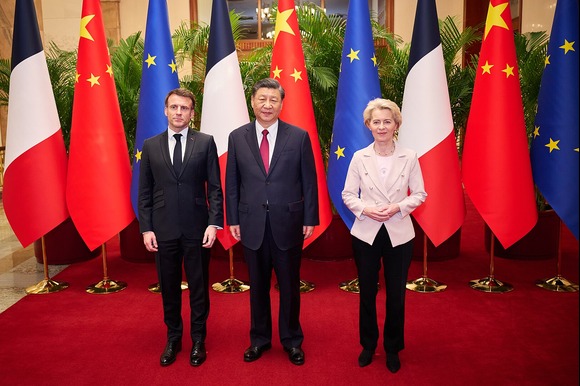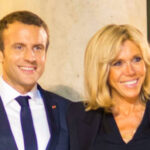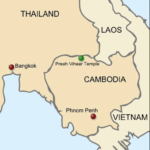EU-China relations have reached an “inflection point,” European Commission President Ursula von der Leyen told Chinese President Xi Jinping during a tense one-day summit in Beijing. The high-level talks, aimed at rebalancing economic ties and addressing geopolitical tensions, underscored deepening mistrust between the two global powers.
“As our cooperation has deepened, so have imbalances,” von der Leyen said, pointing to the European Union’s ballooning trade deficit with China. She also issued a stark warning, saying Beijing’s stance on Russia and the ongoing war in Ukraine had become the “determining factor” in future EU-China relations.
President Xi, in response, urged EU leaders to “properly manage differences,” asserting that “the current challenges facing Europe do not come from China.” Xi also defended China’s economic strategy, saying that “boosting competitiveness does not come from building walls or barriers,” and warned that “decoupling and severing supply chains will only result in self-isolation.”
Expectations for a breakthrough were low going into the summit, which had been shortened to a single day at Beijing’s request. While earlier speculation suggested that a potential return of Donald Trump to the White House might push the EU and China closer, recent developments have instead driven the two sides further apart. Both are facing similar external pressures, notably U.S. tariffs on their exports.
During their meeting at Beijing’s Great Hall of the People, von der Leyen and European Council President António Costa called for practical cooperation and meaningful progress. “It is vital for China and Europe to acknowledge our respective concerns,” von der Leyen said. Xi, in turn, called for building “mutual trust,” according to China’s state news agency Xinhua.
The economic imbalance remains a key sticking point. The EU posted a €305.8bn ($360bn; £265bn) trade deficit with China last year—double what it was nine years ago. The European bloc has criticized China’s industrial overcapacity and imposed tariffs on Chinese electric vehicles, prompting retaliatory measures from Beijing, including duties on European liquor and restrictions on EU medical devices.
Von der Leyen stressed that rebalancing would require China to increase market access for European firms, relax export controls, and address overcapacity. In a sign of potential progress, China’s foreign ministry said it was open to enhancing dialogue on export controls with relevant countries.
Beyond economics, geopolitics loomed large. Von der Leyen and Costa pressed China to use its influence to persuade Russia to end its war in Ukraine. “How China continues to interact with Putin’s war will be a determining factor for our relations going forward,” von der Leyen said at a press conference concluding the summit.
Von der Leyen struck an optimistic tone upon arrival in Beijing, describing the summit as a chance to “advance and rebalance” relations. “I’m convinced there can be a mutually beneficial cooperation… One that can define the next 50 years of our relations,” she posted on X. Both sides initially projected hope, with EU officials welcoming frank discussions and China presenting the summit as an opportunity for renewed collaboration.
Earlier in the week, China’s foreign ministry framed the relationship as being at a “critical juncture of building on past achievements and opening up a new chapter.” But tensions had already been simmering. Xi’s refusal to visit Brussels earlier this year and his participation in Russia’s May Victory Day parade cast a shadow over the proceedings.
Engin Eroglu, chair of the European Parliament’s delegation on China, remarked that the trust between the two sides had deteriorated significantly. “In this atmosphere of strategic mistrust, the mood is clearly tense—if not frosty,” he said.
The Russia-Ukraine war has emerged as a major fault line. The EU’s recent decision to sanction two Chinese banks for allegedly supporting Russia has angered Beijing and created a confrontational backdrop to the summit. China responded by lodging “solemn representations” with the EU’s trade commissioner.
Adding fuel to the fire were reports that Chinese Foreign Minister Wang Yi told EU foreign policy chief Kaja Kallas that China does not want to see Russia lose the war—a stance that contradicts Beijing’s stated position of neutrality. China has denied the reports, but Kallas has previously labeled Beijing a “key enabler” of Russia’s war in Ukraine, asserting that Chinese pressure could make a real difference if applied.
Trade tensions have further aggravated relations. Following the EU’s tariffs on Chinese electric vehicles, Beijing retaliated by targeting European liquor. This month, China also restricted government procurement of EU medical devices—mirroring similar EU measures on Chinese products enacted in June.
Of greater concern to the EU, however, is China’s growing use of its dominance in critical raw materials as leverage. China recently tightened export controls on rare earths and critical minerals, and von der Leyen accused Beijing of weaponizing its “quasi-monopoly” in this domain to undermine global competitors.
Europe, increasingly alarmed by the influx of cheap, subsidized Chinese goods, sees its domestic industries under threat and is pushing back through tariffs and stricter trade regulations.
Meanwhile, diplomatic rhetoric remains sharp. In a recent interview with Chinese state-linked media outlet The Paper, China’s ambassador to the EU, Cai Run, criticized the EU’s “threefold” view of China as a partner, competitor, and systemic rival. “It’s like a traffic light flashing green, amber, and red all at once,” he said. “Not only does it fail to direct traffic—it only creates difficulties and obstruction.”
Despite efforts at diplomacy and discussion, both sides left the summit with lingering disagreements, mutual frustrations, and a shared understanding that relations are at a turning point—with the future of EU-China cooperation hanging in the balance.






